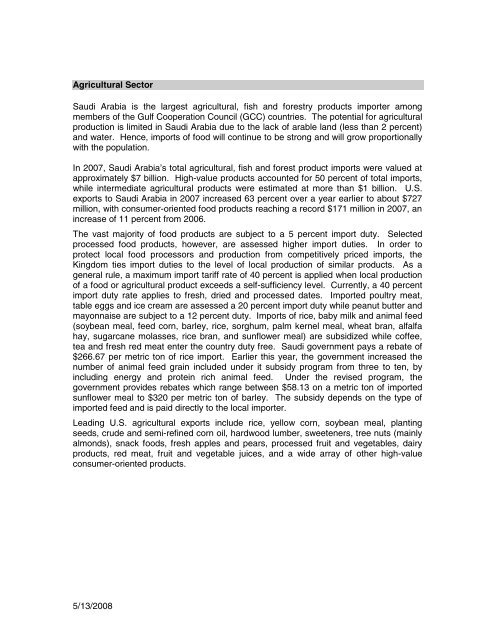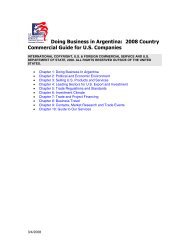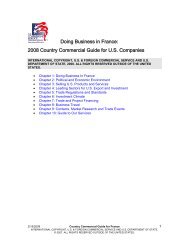Doing Business In Saudi Arabia - Bna
Doing Business In Saudi Arabia - Bna
Doing Business In Saudi Arabia - Bna
Create successful ePaper yourself
Turn your PDF publications into a flip-book with our unique Google optimized e-Paper software.
Agricultural Sector<br />
<strong>Saudi</strong> <strong>Arabia</strong> is the largest agricultural, fish and forestry products importer among<br />
members of the Gulf Cooperation Council (GCC) countries. The potential for agricultural<br />
production is limited in <strong>Saudi</strong> <strong>Arabia</strong> due to the lack of arable land (less than 2 percent)<br />
and water. Hence, imports of food will continue to be strong and will grow proportionally<br />
with the population.<br />
<strong>In</strong> 2007, <strong>Saudi</strong> <strong>Arabia</strong>’s total agricultural, fish and forest product imports were valued at<br />
approximately $7 billion. High-value products accounted for 50 percent of total imports,<br />
while intermediate agricultural products were estimated at more than $1 billion. U.S.<br />
exports to <strong>Saudi</strong> <strong>Arabia</strong> in 2007 increased 63 percent over a year earlier to about $727<br />
million, with consumer-oriented food products reaching a record $171 million in 2007, an<br />
increase of 11 percent from 2006.<br />
The vast majority of food products are subject to a 5 percent import duty. Selected<br />
processed food products, however, are assessed higher import duties. <strong>In</strong> order to<br />
protect local food processors and production from competitively priced imports, the<br />
Kingdom ties import duties to the level of local production of similar products. As a<br />
general rule, a maximum import tariff rate of 40 percent is applied when local production<br />
of a food or agricultural product exceeds a self-sufficiency level. Currently, a 40 percent<br />
import duty rate applies to fresh, dried and processed dates. Imported poultry meat,<br />
table eggs and ice cream are assessed a 20 percent import duty while peanut butter and<br />
mayonnaise are subject to a 12 percent duty. Imports of rice, baby milk and animal feed<br />
(soybean meal, feed corn, barley, rice, sorghum, palm kernel meal, wheat bran, alfalfa<br />
hay, sugarcane molasses, rice bran, and sunflower meal) are subsidized while coffee,<br />
tea and fresh red meat enter the country duty free. <strong>Saudi</strong> government pays a rebate of<br />
$266.67 per metric ton of rice import. Earlier this year, the government increased the<br />
number of animal feed grain included under it subsidy program from three to ten, by<br />
including energy and protein rich animal feed. Under the revised program, the<br />
government provides rebates which range between $58.13 on a metric ton of imported<br />
sunflower meal to $320 per metric ton of barley. The subsidy depends on the type of<br />
imported feed and is paid directly to the local importer.<br />
Leading U.S. agricultural exports include rice, yellow corn, soybean meal, planting<br />
seeds, crude and semi-refined corn oil, hardwood lumber, sweeteners, tree nuts (mainly<br />
almonds), snack foods, fresh apples and pears, processed fruit and vegetables, dairy<br />
products, red meat, fruit and vegetable juices, and a wide array of other high-value<br />
consumer-oriented products.<br />
5/13/2008












